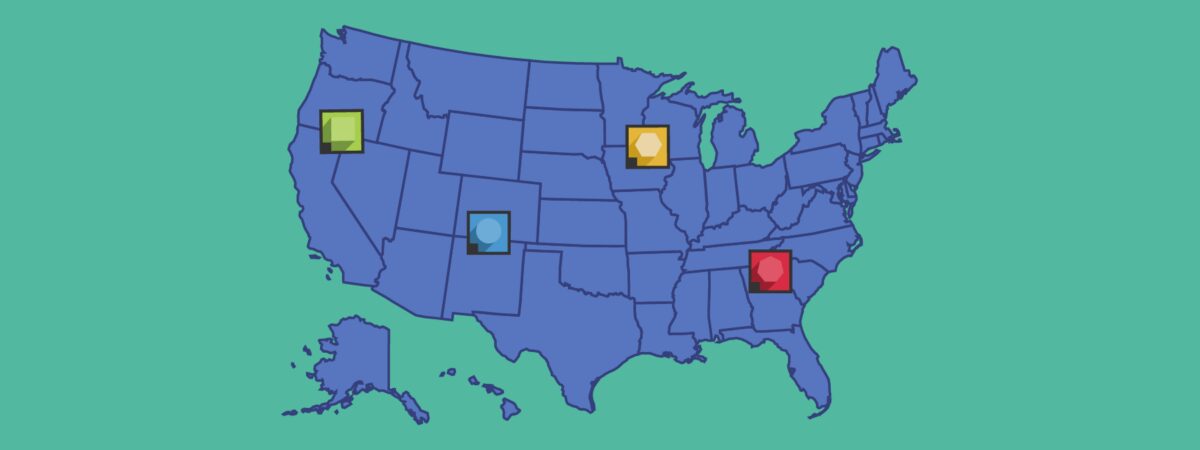For over a decade,
micro-credentials have impacted the credential ecosystem, shifting how learners receive recognition for specific skills. In January 2020, Digital Promise began conducting annual scans of
micro-credential policies in the United States. These updates to the
Educator Micro-credential Policy Map help inform how school districts, higher education institutions, and states throughout the United States engage with micro-credentials.
To capture the growth of micro-credentials in the credential ecosystem, the following classifications are used:
- District-Level Incentives: Individual schools and/or districts with policies recognizing micro-credentials earned by educators or their K-12 students.
- State-Level Policy, Guidelines, or Exploration: Policies supporting micro-credentials are in place at a state-wide level through legislation or the state’s department of education. Moreover, for exploration, the state or the state’s department of education has endorsed the use of micro-credentials or has facilitated a relationship between a third-party organization offering credentialing and other institutions (e.g., higher education) within the state. This may include piloting micro-credentials; creating a committee to evaluate their use; partnering with an organization to develop or distribute micro-credentials; or having a formal discussion on their implementation.
- Institutes of Higher Education: Micro-credentials are offered by higher education institutions as part of the curriculum or are available to educators for credit.
District-Level
There has been notable growth in district-level initiatives implementing micro-credentials. The most recent update of the Micro-credential Policy Map identified four additional district initiatives using micro-credentials for teacher professional development or K-12 students.
- Molokai High School in Hawaii offers digital badges through its Profile of a Molokai Graduate. The profile serves as the foundation for the Personal Transition Plan credit that high school seniors are required to earn. This involves earning 12 digital badges in the areas of career experience, financial literacy, community service, and interview skills.
- The Missouri National Education Association offers self-directed, project-based professional development opportunities to educators, who have access to skill recognition through more than 80 micro-credentials.
- Through Oklahoma State University, Union High School offers its students industry-aligned micro-credentials that recognize competence in skills in areas such as air-conditioning, electrical controls, and refrigeration.
To date, we have identified 35 states with district-level policies supporting some level of micro-credential implementation.
State-Level
Our review of state-level micro-credential policies identified three newly established policies or guidelines. These measures encompass a range of approaches, including the integration of micro-credentials into educator licensure and re-licensure processes, the awarding of micro-credentials, and the formal recognition of demonstrated competencies.
- Montana Office of Public Instruction accepts individual professional development opportunities embedded within micro-credential frameworks if they are eligible for professional development units when delivered by an approved provider and aligned with the Administrative Rules of Montana.
- In Nebraska, the Accelerating Student Success for ELs through Scaffolded Support is an 18-month program of study that leads to the English Learner/Multilingual Learner Educator Badge. Issued through the National Association for Bilingual Education, this badge signifies the attainment of key skills essential for supporting the diverse needs of English or multilingual learners.
- West Virginia Department of Education’s Teacher Leadership Framework describes a teacher leadership role as one that is inclusive of participating in a cohort of teachers seeking micro-credentials.
To date, we have identified 48 states, plus Washington, DC, with state-level policies supporting some level of micro-credential implementation.
Higher Education-Level
In our review of higher education-level micro-credential initiatives, we identified one higher education institution that is newly integrating micro-credentials. These efforts span a range of applications, including integration into general education courses, offerings for current students and the workforce, and education-focused micro-credentials.
- In Idaho, Boise State University’s Department of Writing Studies offers a micro-credential that helps faculty develop strategies that help their students write more effectively and strategically. Also in Idaho, they have developed SkillStack, a micro-credential platform that allows Idaho’s educators to validate their skills and receive industry-relevant digital badges.
To date, we have identified 50 states, plus the District of Columbia, with higher education institutions offering micro-credential implementation.
In the five years we have conducted the educator policy scan, we have recorded 35 states with district-level policies supporting some level of micro-credential implementation, 48 states, plus the District of Columbia, with state-level policies supporting some level of micro-credential implementation, and 50 states, plus the District of Columbia, with higher education-level policies supporting some level of micro-credential implementation.
Explore the updated Educator Micro-credential Policy Map. Let us know what stories of micro-credential engagement are taking place in your community, or what higher education institutions are providing micro-credentials.
Note: While the policy map is as comprehensive as possible, some policies may have changed since the last annual update. The policy map provides up to five findings per level.
Digital Promise has been a pioneer in competency-based micro-credentials and has more than 10 years of experience in supporting organizations with their micro-credentialing needs. Check out this eBook, The Role of Micro-Credentials in Lifelong Learning and Development: Empowering Learners, Empowering Organizations, a comprehensive resource accessible to all interested in understanding micro-credentials. If you are interested in learning more about Digital Promise’s micro-credential services, please contact us at microcredentials@digitalpromise.org.
